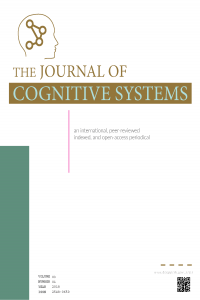Abstract
References
- [1] H. Gardner, " The mind’s new science: A history of the cognitive revolution," New York: Basic Books, 1987.
- [2] G. A. Miller, " The cognitive revolution: a historical perspective," Trends in Cognitive Sciences, vol. 7, 2003, pp. 141-144.
- [3] T. L. Griffiths, " Manifesto for a new (computational) cognitive revolution," Cognition, vol.135, 2015, pp. 21-23.
- [4] P. Thagard, "Cognitive Science," The Stanford Encyclopedia of Philosophy (Fall 2008 Edition), Edward N. Zalta (ed.), 2018.
- [5] H. A. Simon, " Cognitive Science: The newest science of the artifical," Cognitive Science, vol. 4, 1980, pp. 33–46.
- [6] A. Newell and H.A Simon, " Human Problem Solving, " Englewood Cliffs, NJ., Prentice Hall, 1972.
- [7] J. A. Fodor, " Representations: Essays on the Foundations of Cognitive Science," MIT Press, 1981.
- [8] D. Marr, " Vision: A Computational Investigation into the Human Representation and Processing of Visual Information," The MIT Press, London, 2010.
- [9] P. Churchland and T. J. Sejnowski, " The Computational Brain," The MIT Press, London, 1994.
- [10] A. K. Engel, A. Maye, M. Kurthen and P. König, " Where’s the action? The pragmatic turn in cognitive science," Trends in Cognitive Science vol. 15, 2013, pp. 202-209.
- [11] H. C. Cromwell and J. Panksepp, "Rethinking the cognitive revolution from a neural perspective: How overuse/misuse of the term ‘cognition’ and the neglect of affective controls in behavioral neuroscience could be delaying progress in understanding the BrainMind," Neuroscience and Biobehavioral Reviews, vol. 35, 2011, pp. 2026-2035.
- [12] A. Schierwagen, "On reverse engineering in the cognitive and brain sciences," Natural Computing, vol. 11, 2012, pp. 141-150.
- [13] J. Sweller, "Cognitive Load During Problem Solving: Effects on Learning," Cognitive Science vol. 12, 1988, pp. 257-285.
- [14] H. J. Kell, "Noncognitive proponents' conflation of “cognitive skills” and “cognition” and its implications," Personality and Individual Differences, vol. 134, 2018, pp. 25-32.
Abstract
Cognitive Science,
often called cognitive revolution, emerged as an intellectual movement in the
1950s. Cognitive science is an interdisciplinary scientific study of mind and
thought processes, including philosophy, psychology, artificial intelligence,
neuroscience, linguistics and anthropology. It examines the nature, functions
and tasks of cognition. There have been some differences between the cognitive
revolution in infancy and the current cognitive revolution. In today's
cognitive revolution; artificial cognitive systems, as well as the results of
the investigation of organisms and behavior are discussed. In studies on
cognitive systems, it is important to draw attention to the potential benefits
of the application and to emphasize its importance. The aim of this study is to
examine the meaning of the cognitive system and the related disciplines and to
examine the general researches on this subject.
References
- [1] H. Gardner, " The mind’s new science: A history of the cognitive revolution," New York: Basic Books, 1987.
- [2] G. A. Miller, " The cognitive revolution: a historical perspective," Trends in Cognitive Sciences, vol. 7, 2003, pp. 141-144.
- [3] T. L. Griffiths, " Manifesto for a new (computational) cognitive revolution," Cognition, vol.135, 2015, pp. 21-23.
- [4] P. Thagard, "Cognitive Science," The Stanford Encyclopedia of Philosophy (Fall 2008 Edition), Edward N. Zalta (ed.), 2018.
- [5] H. A. Simon, " Cognitive Science: The newest science of the artifical," Cognitive Science, vol. 4, 1980, pp. 33–46.
- [6] A. Newell and H.A Simon, " Human Problem Solving, " Englewood Cliffs, NJ., Prentice Hall, 1972.
- [7] J. A. Fodor, " Representations: Essays on the Foundations of Cognitive Science," MIT Press, 1981.
- [8] D. Marr, " Vision: A Computational Investigation into the Human Representation and Processing of Visual Information," The MIT Press, London, 2010.
- [9] P. Churchland and T. J. Sejnowski, " The Computational Brain," The MIT Press, London, 1994.
- [10] A. K. Engel, A. Maye, M. Kurthen and P. König, " Where’s the action? The pragmatic turn in cognitive science," Trends in Cognitive Science vol. 15, 2013, pp. 202-209.
- [11] H. C. Cromwell and J. Panksepp, "Rethinking the cognitive revolution from a neural perspective: How overuse/misuse of the term ‘cognition’ and the neglect of affective controls in behavioral neuroscience could be delaying progress in understanding the BrainMind," Neuroscience and Biobehavioral Reviews, vol. 35, 2011, pp. 2026-2035.
- [12] A. Schierwagen, "On reverse engineering in the cognitive and brain sciences," Natural Computing, vol. 11, 2012, pp. 141-150.
- [13] J. Sweller, "Cognitive Load During Problem Solving: Effects on Learning," Cognitive Science vol. 12, 1988, pp. 257-285.
- [14] H. J. Kell, "Noncognitive proponents' conflation of “cognitive skills” and “cognition” and its implications," Personality and Individual Differences, vol. 134, 2018, pp. 25-32.
Details
| Primary Language | English |
|---|---|
| Journal Section | Articles |
| Authors | |
| Publication Date | December 1, 2018 |
| Published in Issue | Year 2018 Volume: 3 Issue: 1 |


